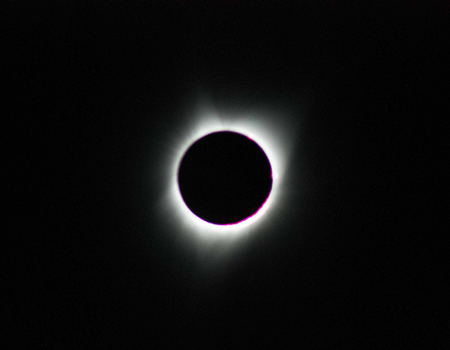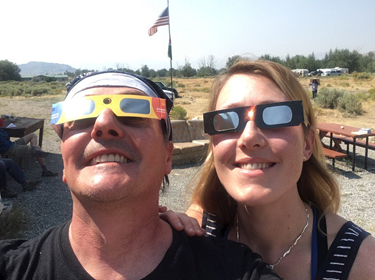From NASA TV to KQED radio to the pages of The New York Times, graduates of the Science Communication Program played a major role in conveying the scientific and societal impacts of the August 21 solar eclipse to eager readers.
Their reports spanned every medium, from print and broadcast to slideshows and social media, and every time zone in the country. SciCom graduates worked as editors of national coverage, on-location hosts, and authors of explanatory and public-service pieces. The alumni also hailed from each of the program’s four decades, from its founding in 1981 to several members of the latest graduating class.
Here is a representative sampling of eclipse stories by nearly two dozen alumni—many of whom reveled in seeing totality for the first time themselves:
NASA’s four-hour live online broadcast—which the agency estimates attracted 40 million views at different times—was co-anchored by Karen Fox ’93, NASA’s lead science writer for heliophysics:
“Eclipse Across America: Through the Eyes of NASA” (August 21)
Extensive coverage in The New York Times featured the work of science writers Nicholas St. Fleur ’14 and Kenneth Chang ’95.
From Nick:
“A College Town Gets Ready for Its Moment Under No Sun” (June 30)
“An Eclipse Chaser’s Guide to Your First Eclipse” (August 14)
“Scientist to Take Flight for Longer Views of the Eclipse” (August 14)
Host of Facebook Live segment on eclipse safety (August 18)
“How to Watch a Solar Eclipse” (“Be a Citizen Scientist” portion)
“Seeing the Total Eclipse Through 28,000 Eyes” (August 25)
From Ken:
“The Illuminating Power of Eclipses” (August 14)
and from both reporters on location (Nick in Carbondale, Ill.; Ken in Loudon, Tenn.):
“The Solar Eclipse: Highlights From Its Path Across the United States” (August 21)
“A Total Solar Eclipse Leaves a Nation in Awe” (August 21)
Laura Helmuth ’98 managed wall-to-wall coverage in the Washington Post as the newspaper’s health, science, and environment editor. The Post featured some 120 stories before the eclipse, archived here:
“Everything you need to know about the Aug. 21 solar eclipse”
Helmuth’s team produced a six-page special newspaper insert published on August 20. The next day, Helmuth coordinated reports from a team of 25 staff writers and freelancers, including these pieces:
“’We are all just mind-boggled:’ scenes from the total solar eclipse of 2017”
“Best images of the total solar eclipse”
“Watch highlights from the great American eclipse”
At The Wall Street Journal, digital science editor Daniela Hernandez ’12 created and helped to coordinate the newspaper’s live eclipse blog:
“Solar Eclipse 2017: From Coast to Coast”
Daniela also filed or contributed to several reports and graphics leading up to the eclipse:
“Eclipses Through the Ages: The Times the Earth Went Dark” (slideshow)
“Sorry I Missed the Wedding—I Forgot to Take Off My Eclipse Glasses” (August 8)
“Counterfeiters Cast a Shadow on Booming Sales of Eclipse Glasses” (August 10)
“Final Eclipse Plans Under Way as Celestial Event Nears” (August 20)
Astronomy reporter Lisa Grossman ’09 covered ten questions for Science News in the days leading up to the eclipse—and filed a report from Wyoming hours afterward:
“What will scientists learn from the Great American Eclipse?” (August 11-20)
“On a mountain in Wyoming, the eclipse brings wonder—and, hopefully, answers” (August 21)
KQED public radio in San Francisco aired numerous reports, including this work by science news editor Danielle Venton ’11:
“You Know About This Summer’s Spectacular Solar Eclipse, Right?” (June 20)
“Eclipse Scientists Probe the Mysteries of the Sun’s Atmosphere” (August 14)
“See a Total Solar Eclipse in This Animated View from Space” (August 16)
“Everything That Happened Monday During the Solar Eclipse” (August 21; audio segment under “Update 8 a.m.”)
Tia Ghose ’10, senior writer for Live Science, covered many aspects of the eclipse before, during, and after:
“Has Anyone Ever Gone Blind from Staring at a Solar Eclipse?” (June 30)
“Ancient Greeks Built an Eclipse-Predicting ‘Computer’ 2,000 Years Ago” (August 15)
“Scientists Respond to the Total Solar Eclipse on Twitter” (August 21)
“Today’s Eclipse May Help Scientists Predict Space Weather Storms” (August 21)
“The Solar Eclipse Had a Spooky Effect on Nature” (August 22)
Stephanie Pappas ’09 also reported for Live Science from the zone of totality in Wyoming:
“Great American Eclipse Casts Shadow Over Great American Desert” (August 21)
Space.com, a sister site to Live Science, ran many eclipse stories by senior writer Mike Wall ’09, including these:
“It’s Coming! Get Ready for the ‘Great American Total Solar Eclipse of 2017” (January 2)
“Behold! The First ‘Megamovie’ of the 2017 Solar Eclipse” (August 22)
“Great American Solar Eclipse Breaks NASA’s Web-Viewing Records” (August 25)
Contributing editor Alexandra Witze ’93 filed this preview for Nature:
“Mysteries of Sun’s corona on view during upcoming eclipse” (August 9)
and this freelance piece for Air & Space Magazine:
“Chasing the Eclipse at 45,000 Feet” (August 16)
Christie Aschwanden ’98, lead science writer for FiveThirtyEight, contributed to two podcasts about the eclipse, including an interview with author David Baron about the 1878 eclipse in the western U.S.:
“The Eclipse Was A Big Deal in 1878, Too” (August 10)
Her day-of account appeared in this roundup by FiveThirtyEight reporters:
“Now Stare Directly At This Eclipse Story” (August 21)
Christie also was among several slugs to write posts for “Eclipse Week” at the noted science writing blog The Last Word on Nothing:
“Seen Through Every Lens” (August 15) by Erik Vance ’06, freelance writer in Mexico City
“Why the last eclipse mattered and this one will too” (August 17) by Christie Aschwanden
“On the Path of Totality” (August 22) by Helen Fields ’03, freelance writer in Washington D.C.
Clara Moskowitz ’07, senior editor at Scientific American, edited this feature by veteran eclipse scientist Jay Pasachoff of Williams College for the magazine:
“Total Solar Eclipse Offers Rare Chance to Understand the Sun’s Atmosphere” (August issue, subscription required)
Yasemin Saplakoglu ’17 wrote a page A1 preview for the San Jose Mercury News during her internship there:
“All-American eclipse has Californians stirring with excitement” (June 20)
At the San Francisco Exploratorium, Eileen Campbell ’83 contributed pieces to the museum’s online explainers for visitors and the public:
“Scouting Oregon for the 2017 Solar Eclipse” (September 7, 2016)
“Moon to the Eclipse” (July 8, with several subsequent posts)
University of Utah science writer Lisa Marie Potter ’15 produced this preview video for the campus news office:
“The Great American Eclipse” (August 10)
Writing for the Stanford School of Medicine blog, Krista Conger ’99 somehow found a link with genetics (edited by Becky Bach ’14):
“New ‘genome cloaking’ technique blocks private data, just as moon blocks sun during eclipse” (August 21)
Graduates who publish personal blogs also weighed in, including Sarah McQuate ’17 from Oregon:
“No Learjet required” (August 22)
and Dana Mackenzie ’97 from Tennessee:
“The Great Eclipse Trip of 2017” (August 27)
And finally, recent graduate Sukee Bennett ’17 spoke with an ophthalmologist at UC San Francisco for this public-service piece:
“Viewing the Solar Eclipse? Take Precautions to Avoid Serious Eye Damage” (August 14)
with this accompanying video, produced by Sukee:


